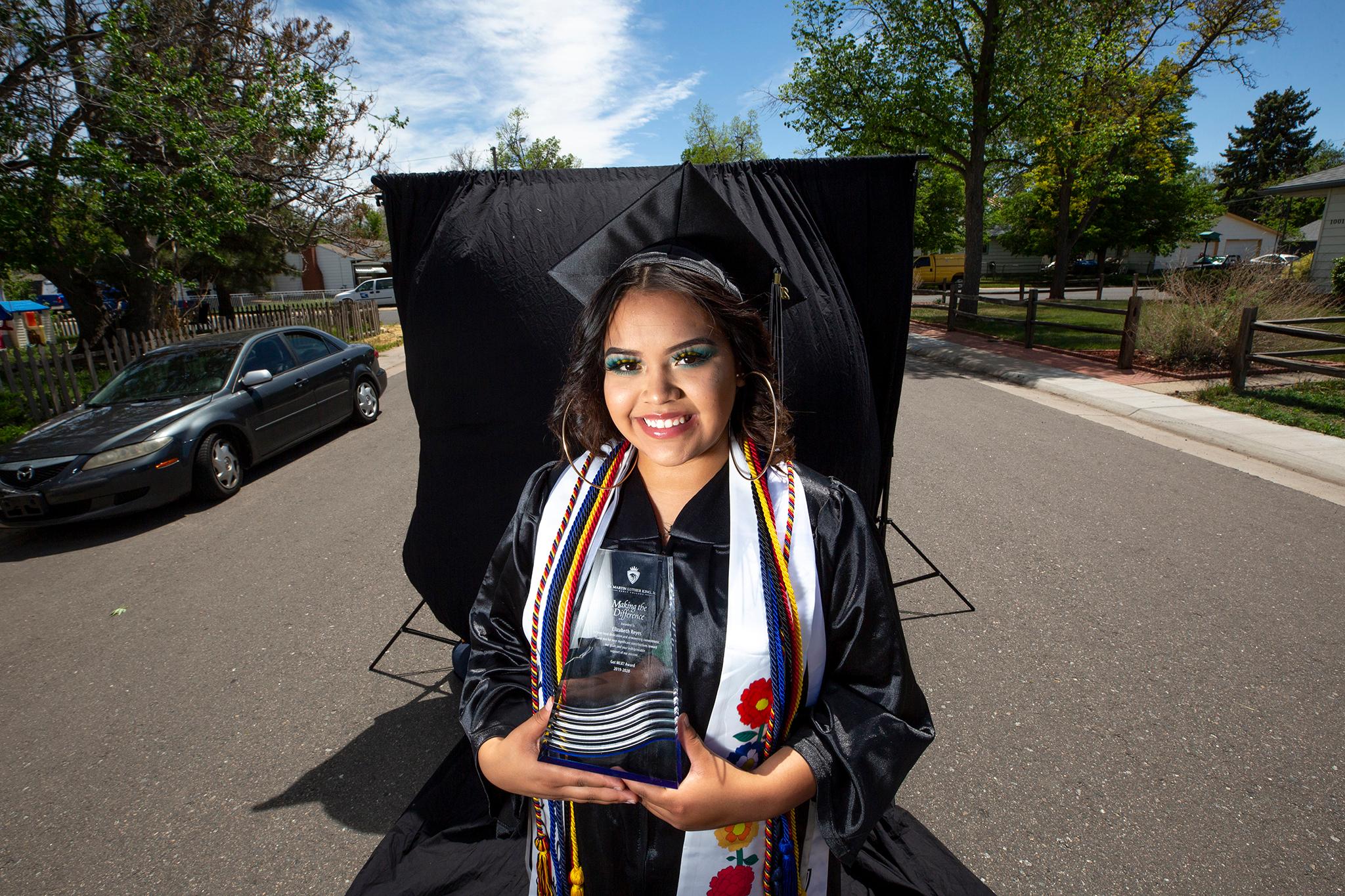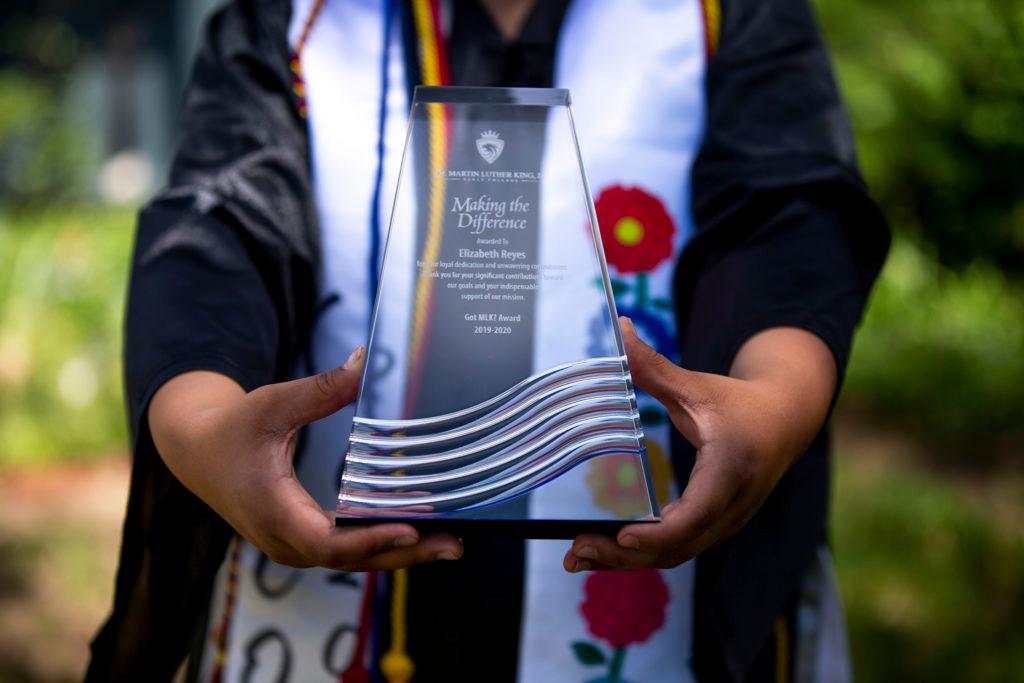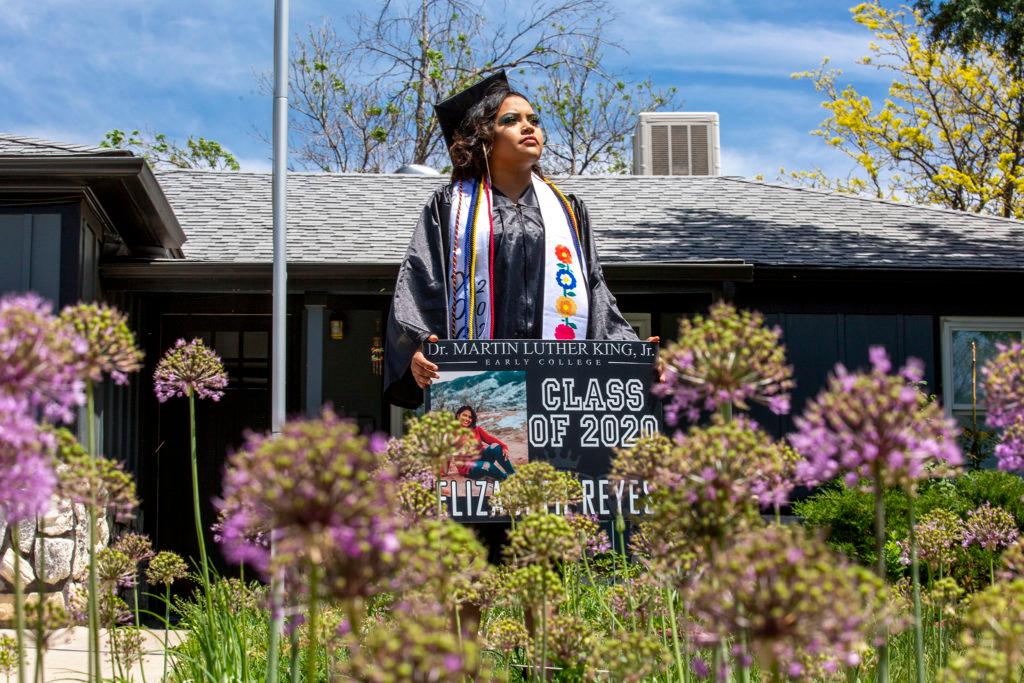
Thousands of Colorado students won’t be walking graduation stages this month because of the coronavirus. And thousands of high school seniors are still debating what to do if online learning is the only option for college.
With the pandemic casting uncertainty for so many graduates, colleges are wondering: will students show up in the fall?
Elizabeth Reyes will.
The coronavirus hasn’t lessened the mountains the 17-year-old has had to climb to get to graduation. A senior at Dr. Martin Luther King Jr. Early College high school in Denver, Elizabeth went from a 7-year-old sleeping in a parking lot, homeless after escaping with her aunt from the violence in her home, to being the first of six children to graduate.
Still, many students just like her are on the fence about what to do next year.
The most recent national survey shows that a third of students may delay or cancel if classes go fully online. In a recent webinar, Colorado high school counselors said students are wondering whether campuses will be safe and what classes will look like. One Durango counselor said 20 to 30 percent of her students are rethinking going away to college far from home, or considering community college first instead, and then transferring to a four-year school. Low-income students are changing college plans to help their families who have lost jobs.
Colorado State University received a record number of applications this year, but like other colleges, it is seeing about a 10 percent drop in the number of students who commit through a deposit — that’s 650 students.
“Is it a matter of students just holding off on their decision waiting to see how this thing plays out a little bit or are there that many students planning to just not go to college?” asked Tom Biedscheid, CSU’s assistant vice president of the Division of Enrollment and Access.
Officials are encouraging students to enroll in higher education this fall and transfer later if they are looking to stay closer to home for a semester.
“The next step might not be a full load of courses.” said Angie Paccione, executive director of the Colorado Department of Higher Education. “Maybe you want to take a few courses and not a full load, that’s OK. Maybe you want to join the military, that’s OK. But take the next step that’s right for you.”
The national survey found that a campus that physically opens with simple social distancing measures is likely to retain 95 percent of their commitments.
That’s what sealed the deal for Elizabeth, who decided on Arizona State University over a local school. She learned it was reopening.
“I would not pay an out-of-state tuition (or reduced WUE reduced tuition that she received) if I could get those same online resources at home,” she said.
Not enrolling in post-secondary school next year or taking a “gap” year was never a consideration. Elizabeth said she likes learning too much and has waited too long for this moment.

“If anything happens — it’s your life that you’re messing up.”
Elizabeth’s tumultuous journey to this point started that night she and her aunt fled a violent situation, driving to a parking lot at Sloan’s Lake. The 7-year-old couldn’t sleep. She stared at the moon wondering why things were the way they were. Why was her mom gone from her life? Why did her dad drink so much? Why did she see violence and drug addiction? Elizabeth knew she’d have to fend for herself — and care for her younger siblings to survive.
“I learned to quiet my emotions because they made me look weak. I learned to silence my voice because no one around me seemed to care,” she said.
What she didn’t know was that the journey to make something of her life would get even harder. There was a lot of family turmoil, but her dad was big on education. She remembers him in the summer leading reading sessions, drawing competitions and spelling bees — when he was around. But chaos made it hard to study. Shuffling back and forth between relatives’ homes. In total, she went to 15 schools up until now.
In eighth grade with her father back in prison, Elizabeth was confused and heartbroken. She began acting out, skipping school. Teachers told her she was bright and tried to coax her back. But it was something her dad said to her on a call from prison that changed her.
“He was like, ‘I lived the life I lived. Your mother lived the life she lived but it doesn’t mean you can accuse us for the things that are going on in your life because it’s your life. You’re the one choosing to do this. If anything happens — it’s your life that you’re messing up.”
That did it.
“I wanted to make sure that all the generational curses ended with me,” Elizabeth said.
She resolved to do better and be a good example for her three younger siblings.
In high school, she joined the track team, volunteered and worked several jobs to help pay the family bills. But her living situation was still hostile. She almost dropped out. But mentors helped her rally, especially those at Minds Matter, a Denver group that helps high achieving students from low-income neighborhoods attend college. They would tell her, “It’s too late to give up now,” she said with a laugh.
Earlier this year Elizabeth became a McKinney Vento Act student, a federal designation for homeless youth, defined as “individuals who lack a fixed, regular, and adequate nighttime residence.” The designation has helped. It paid her school fees and provided other support.
When COVID-19 shuttered schools, it made that push to the graduation finish line even harder. Not having an in-person math teacher who could instantly help made math really hard. What she’s missed most are her special education students. Elizabeth had a paid apprenticeship at her school.
“I've cried like five times,” she said. “I miss them so much. I just miss all of their personalities and just how smart they were and we were all building a relationship with each other.”
During the shutdown, Elizabeth continued to teach cooking and other classes to her special education students online, do her school work and take a late-night job to help an aunt pay her rent.
Despite the impact of the coronavirus, Elizabeth is using the time to think about a lot of things, like how the planet is restoring, and air and water getting cleaner as people shutter inside. And she is thinking about her own life and the goals she wants to accomplish.
High school graduation was going to be a big deal. She’ll be the first of six kids to graduate. Her two older brothers dropped out. A lot of people were going to come to her graduation before in-person ceremonies were canceled. Even a great-grandmother from Laguna Pueblo, New Mexico, west of Albuquerque, was going to attend. She said graduation in families like hers is a big validation.
“You made it, you know what I mean? That's one of those things where my family just takes those accomplishments and just kind of (says), we can all make it.”

“Did you hear about the rose that grew from a crack in the concrete?”
That’s a line from Tupac Shakur’s song that Elizabeth recited during a speech at a fundraiser for Minds Matter. She said that everyone expects a weed to come out of the crack in the concrete.
“I was supposed to be another weed,” she says. “I was supposed to be a pregnant dropout that had a baby, and was in an abusive relationship. That’s what society expected from me. Or I was supposed to be a drug addict walking up and down Colfax or a prostitute maybe, because that’s where life’s journey brought me.”
She remembers the day someone told her she was the rose that grew from concrete.
“I didn’t let the worst of things get to me. I didn’t let all the negativity and all the things I’ve experienced hold me down and make me upset and make me have hatred and anger and be bitter and ruin my life. I blossomed, in the crack of a concrete, somewhere you never expect for a rose to bloom.”
Elizabeth will emcee part of her school’s virtual graduation on May 26.
She plans to major in criminology and criminal justice at Arizona State University. To pay for college, she’s got some grants, is hoping for scholarships and knows she’ll have to take out some loans. But she’s always dreamed of an out of state experience.
“I feel like I have a lot to offer the world but also stepping out of my comfort zone and going to a different state I feel like that has a lot to offer me to grow as a person.”
Elizabeth didn't let a rough family life stop her from making it this far, so a pandemic won’t either.








